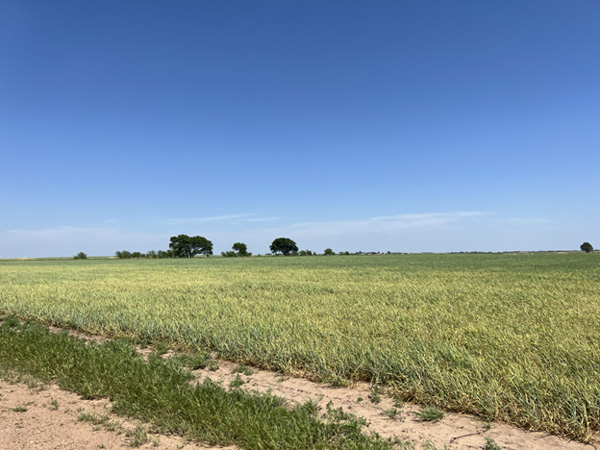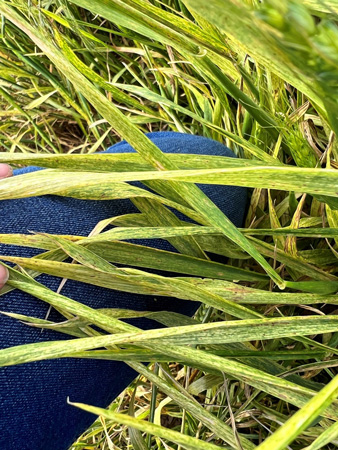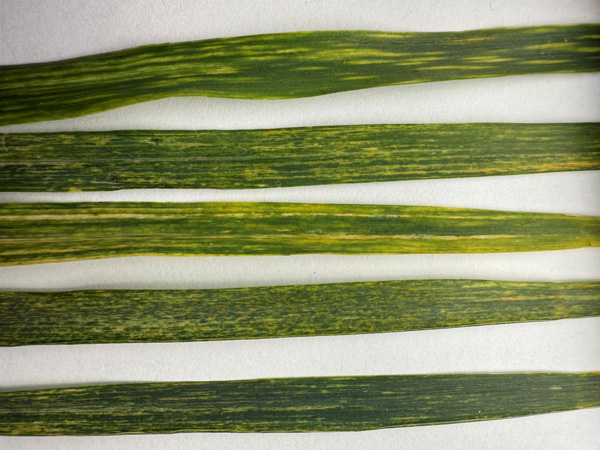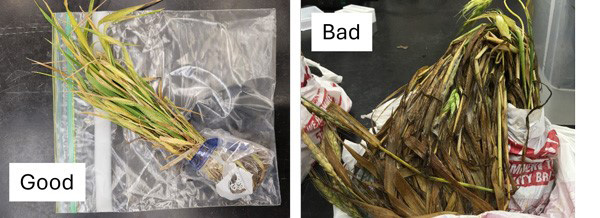Over the last several weeks, symptoms of wheat streak mosaic virus have been showing up in wheat fields across Kansas (Figure 1). This disease complex can be caused by several viruses, including wheat streak mosaic virus, Triticum mosaic virus, and wheat mosaic virus (high plains). It can be important to distinguish wheat streak complex from other wheat diseases. The K-State Plant Disease Diagnostic Laboratory offers wheat virus testing.



Figure 1. Field view of a field turning yellow from wheat streak mosaic complex (top) and various symptoms of wheat streak mosaic complex (bottom two photos). Symptoms may vary based on the time of infection and the variety. Photos by Kelsey Andersen Onofre, K-State Research and Extension.
As a reminder, the K-State Plant Disease Diagnostic Lab provides timely diagnostics of plant pathogenic fungi, bacteria, viruses, and fungal-like organisms. Our mission is to provide this service to K-State Research and Extension personnel, consultants, commercial producers, landscape companies, and homeowners both within and outside of Kansas. After diagnosis, we will provide research-based resources and connect you with one of our experts to answer any questions.
Fee adjustments for 2025
Below is a table that lists the fees for various services offered by the K-State plant disease diagnostic lab. The wheat virus screen (ELISA) includes testing for 6 common wheat viruses (including those that result in wheat streak mosaic complex). If samples are submitted for virus testing through a county extension office, the fee is $55.00. If they are submitted externally (not through KSRE), the fee is $75.00.
Table 1. K-State Plant Disease Diagnostic Lab Services and Fees.
|
Diagnostic Service |
Internal Charges (KSRE) |
External Charges |
|
Digital Diagnosis |
$0 |
$0 |
|
Routine Diagnosis (per sample) |
$12 |
$15 |
|
There is no routine diagnosis charge when running the specialized tests listed below. |
||
|
Fescue Endophyte |
$30 |
$40 |
|
Nematode – Soybean Cyst Nematode |
$30 |
$40 |
|
Nematode – Pine Wilt |
$30 |
$40 |
|
ELISA (wheat virus screen-6 pathogens) |
$55 |
$75 |
|
Molecular (first/single pathogen) |
$55 |
$75 |
|
Molecular (each additional pathogen) |
$20 |
$30 |
The 6 wheat viruses that we screen for are Wheat Streak Mosaic Virus (WSMV), Triticum mosaic Virus (TriMV), High Plains Wheat Mosaic Virus (HPWMoV), Wheat Spindle Streak Mosaic Virus (WSSMV), Soil-borne Wheat Mosaic Virus (SBWMV), and Barley Yellow Dwarf Virus- PAV (BYDV-PAV).
Sample Submission – High-quality samples lead to high-quality diagnoses
- Collect and ship samples on or before Wednesday to avoid weekend storage.
- Collect healthy and symptomatic plants (labeled).
- Collect the entire plant.
- Dig up the plant to keep the root system intact.
- Bag roots separately to avoid soil contact with leaves.
- Place bagged roots and above-ground materials in a larger plastic bag.
- Label and use plastic bags instead of paper; do NOT add water. This maintains sample integrity.
- Once collected:
- Fill out the submission form with as much information as possible. Include variety/hybrid info (especially for wheat). Attach it to the outside of the sample bag.
- Ship plants ASAP overnight via UPS or FedEx when possible. USPS can take up to 14 days.
- Send plant sample photos to clinic@ksu.edu with the tracking number or date shipped.
- 3 useful types of images (see Figure 2 for an example of a good versus bad sample submission)
- Symptom/problem up close and in focus
- Entire plant from ground level to the top of the plant
- Site – capture the pattern in the field, transition areas, terraces, etc.
- 3 useful types of images (see Figure 2 for an example of a good versus bad sample submission)

Figure 2. The photo on the left is an example of a good sample submission. The picture on the right is a poor sample submission.
If you have any questions, comments, or concerns, please contact us via clinic@ksu.edu or 785-532-6176. You can also visit the lab website at: https://www.plantpath.k-state.edu/extension/plant-disease-diagnostic-lab/
Chandler Day, Associate Diagnostician
chandlerday@ksu.edu
Kelsey Andersen Onofre, Extension Wheat Pathologist
andersenk@ksu.edu
Tags: disease Plant Disease Diagnostic Lab wheat streak mosaic wheat virus testing